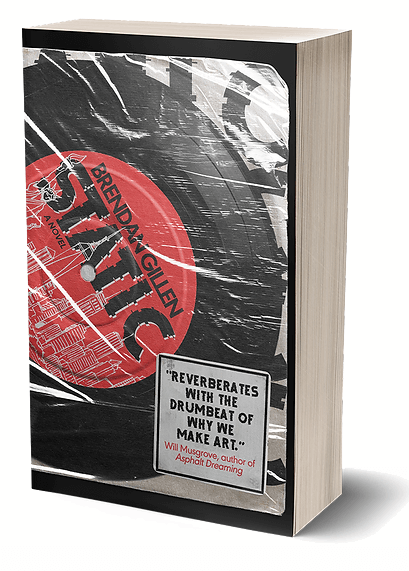Review of “Static,” by Brendan Gillen
Review by Michael Quinn
New York has always been a magnet for ambitious creative types. Making it in this city rewards you with a unique badge of honor—though success here often comes at a high price. How much are you willing to pay?
This question lies at the heart of “Static,” the well-paced debut novel by Red Hook author Brendan Gillen. The richly drawn story, with an insider’s eye for detail, features a compelling cast of characters connected to the local music scene. It traces their dreams and disappointments, zeroing in on the one thing that often fuels the two: money.
Paul, the protagonist, moved from Ohio seven years earlier, hoping to make it as a musician before he turns 30. He leaves a cushy corporate job for a low-paying gig at Dead Wax, a West Village record store. The place is a haven for self-sabotaging misfits. Cranky owner Mika crafts “electronic sludge” music that drives customers away at closing time while co-worker Dante talks about being a rapper more than he raps.
What sets Paul apart is his relentless drive. He’s willing to do whatever it takes to survive—even if it means stealing food from bodegas and records from Dead Wax to sell online. Meanwhile, his bandmate, Bunky, the son of successful visual artists, “seemed as embarrassed of his wealth as Paul was at his lack of it.” The tattoo-fingered bassist moonlights as a bartender while striving to prove himself as an artist in his own right.
Despite Paul’s talent for crafting “lived-in, soulful beats,” he and Bunky are in a creative rut. After another fruitless jam session, Bunky tells Paul, “I’m done with DIY, man. I’m done giving away stuff for free. I’m trying to make another album. What are you trying to do?”
Paul’s consumed by a mounting desperation as his milestone birthday looms. A bad breakup only deepens his sense of failure, which is further compounded by the success of his high school friend, Gallo, whose folksy rock band has garnered critical and commercial acclaim. The old friends take a walk around Red Hook, and “as the shuttered grates of industrial buildings slowly gave way to wine shops and stationery stores … he was suddenly aware that he and Gallo would never be friends in the same way again.” Paul feels eclipsed, like the sun behind a fast-moving cloud.
A chance encounter with a soulful subway busker gives Paul a fleeting sense of hope. Transfixed by her haunting voice and the “honesty” of her performance, he suddenly sees a way forward musically. But as his problems escalate—facing eviction from his rundown Red Hook apartment at the same time his financially-strapped parents are forced from his childhood home—Paul’s desperation drives him to the breaking point. Fueled by the fantasy of a quick financial fix, he crosses moral and ethical lines, risking everything. How far will Paul go to achieve his dreams?
Gillen made a bold choice centering his novel around Paul, a self-absorbed and morally ambiguous character. Paul views “right” and “wrong” through the lens of his self-interest. Yet, the novel doesn’t pass judgment, leaving any ethical questions to the reader. Despite his flaws, Paul’s desire to leave his mark on the world is tragically relatable. “Static” skillfully captures the all-consuming nature of artistic ambition and the lies we tell ourselves to justify what it takes to reach the top.









